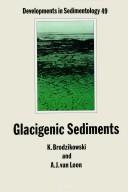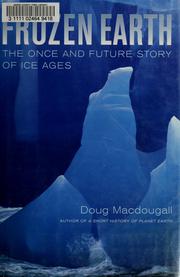| Listing 1 - 3 of 3 |
Sort by
|

ISBN: 044488307X 9786611782733 1281782734 0080869637 Year: 1991 Volume: 49 Publisher: Amsterdam : Elsevier,
Abstract | Keywords | Export | Availability | Bookmark
 Loading...
Loading...Choose an application
- Reference Manager
- EndNote
- RefWorks (Direct export to RefWorks)
This book aims primarily at providing those involved in fundamental or applied research in the fields of geology, geomorphology and hydrology with a systematic overview of glacigenic sediments. A generally applicable terminology is proposed which should facilitate communication between scientists from several fields. Also it should form a bridge between western and eastern ""schools"" dealing with Quaternary geology. Because the book is mainly devoted to depositional processes and the resulting deposits, the approach and the terminology followed in this book are obviously founded strongly on
Sediments (Geology) --- Glacial landforms. --- Glacial epoch. --- Glacial epoch --- Glacial landforms --- Epoque glaciaire --- Géomorphologie glaciaire --- Sédiments (Géologie) --- Ice Age --- Geology, Stratigraphic --- Glaciated terrain --- Landforms --- Periglacial processes --- Geology --- Physical geography --- Sedimentary rocks --- Sedimentation and deposition --- Marine sediments --- Slackwater deposits
Book
ISSN: 18720684 ISBN: 9004241701 9789004241701 1299690912 9781299690912 9789004241695 9004241698 Year: 2013 Volume: v. 37 Publisher: Leiden Brill
Abstract | Keywords | Export | Availability | Bookmark
 Loading...
Loading...Choose an application
- Reference Manager
- EndNote
- RefWorks (Direct export to RefWorks)
Tobias Krüger explores the discovery of the Ice Ages, how the idea was received, and what further research it stimulated. The approach used in Discovering the Ice Ages is uniquely sweeping. The contemporary debates on the subject are compared from an international perspective. Krüger retraces the arguments advanced from the middle of the 18th century to the threshold of the 20th century. The positions held by defenders of the glacial theory as well as those by its most important opponents are set within the context of the then current understanding of geology. In an interdisciplinary overview Krüger then focuses on the impetus gained from early ice-age research. The most prominent examples worth mentioning are the discovery of trace gases and the greenhouse effect.
Geology, Stratigraphic --- Glacial epoch. --- Geology --- Climatology --- Climate --- Climate science --- Climate sciences --- Science of climate --- Atmospheric science --- Ice Age --- Pleistocene Epoch --- Glacial epoch --- History. --- Stratigraphie --- Epoque glaciaire --- Géologie --- Climatologie --- Histoire

ISBN: 0520954947 9780520954946 1299051588 9781299051584 9780520239227 0520239229 0520248244 9780520248243 0520275926 9780520275928 0520239229 9780520248243 9780520275928 Year: 2013 Publisher: Berkeley University of California Press
Abstract | Keywords | Export | Availability | Bookmark
 Loading...
Loading...Choose an application
- Reference Manager
- EndNote
- RefWorks (Direct export to RefWorks)
In this engrossing and accessible book, Doug Macdougall explores the causes and effects of ice ages that have gripped our planet throughout its history, from the earliest known glaciation-nearly three billion years ago-to the present. Following the development of scientific ideas about these dramatic events, Macdougall traces the lives of many of the brilliant and intriguing characters who have contributed to the evolving understanding of how ice ages come about. As it explains how the great Pleistocene Ice Age has shaped the earth's landscape and influenced the course of human evolution, Frozen Earth also provides a fascinating look at how science is done, how the excitement of discovery drives scientists to explore and investigate, and how timing and chance play a part in the acceptance of new scientific ideas. Macdougall describes the awesome power of cataclysmic floods that marked the melting of the glaciers of the Pleistocene Ice Age. He probes the chilling evidence for "Snowball Earth," an episode far back in the earth's past that may have seen our planet encased in ice from pole to pole. He discusses the accumulating evidence from deep-sea sediment cores, as well as ice cores from Greenland and the Antarctic, that suggests fast-changing ice age climates may have directly impacted the evolution of our species and the course of human migration and civilization. Frozen Earth also chronicles how the concept of the ice age has gripped the imagination of scientists for almost two centuries. It offers an absorbing consideration of how current studies of Pleistocene climate may help us understand earth's future climate changes, including the question of when the next glacial interval will occur.
Glacial epoch. --- Global environmental change. --- Paleoclimatology. --- Geology --- Earth & Environmental Sciences --- Stratigraphy --- Epoque glaciaire --- Paléoclimatologie --- Changement global (Environnement) --- Glacial epoch --- Paleoclimatology --- Global environmental change --- Geologic climate --- Palaeoclimatology --- Paleoclimate --- Climatic changes --- Climatology --- Ice Age --- Geology, Stratigraphic --- Environmental change, Global --- Global change, Environmental --- Global environmental changes --- Change --- Ecology --- 551.4 --- biographical chapters. --- biology. --- cataclysmic floods. --- climate and disaster. --- climate change. --- climate. --- climatology. --- earth sciences. --- ecology. --- engaging. --- environment. --- environmental changes. --- geography. --- geology. --- glacial interval. --- glaciation. --- history. --- human evolution. --- human migration. --- ice age. --- marine and oceanic. --- nasa. --- natural history. --- natural sciences. --- nature. --- oceanography. --- paleontology. --- phenomenon. --- planetary science. --- pleistocene ice age. --- pleistocene. --- popular science. --- prehistory. --- science and math. --- science. --- snowball earth. --- weather.
| Listing 1 - 3 of 3 |
Sort by
|

 Search
Search Feedback
Feedback About
About Help
Help News
News